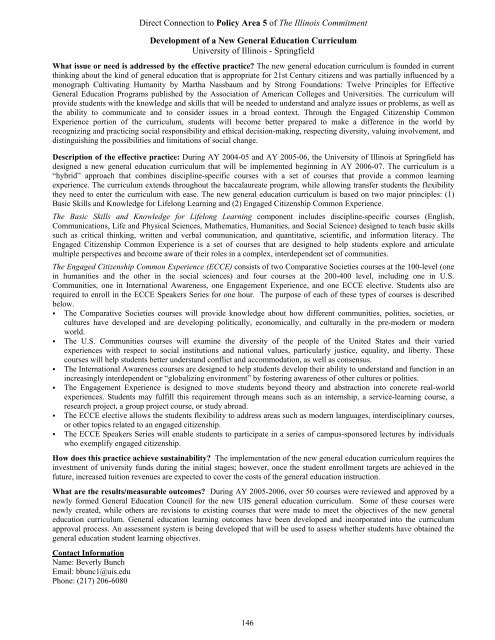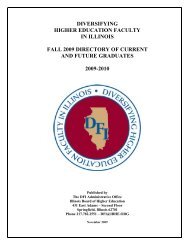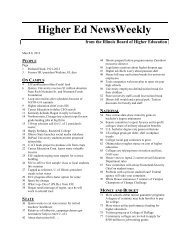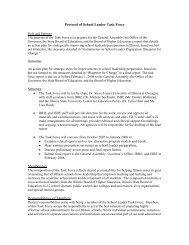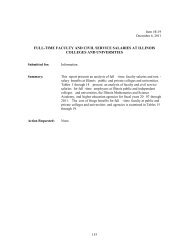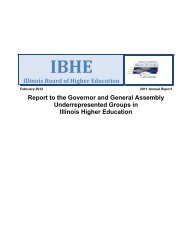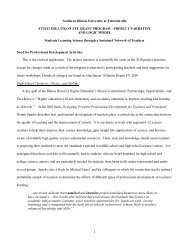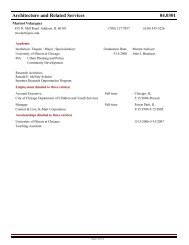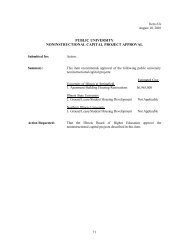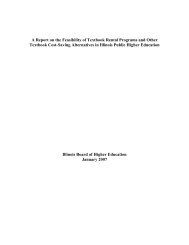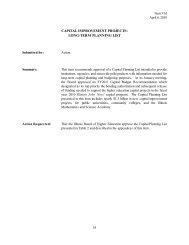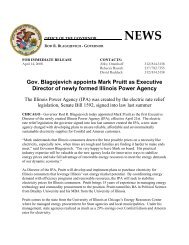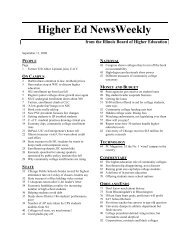Title of Effective Practice: - California Postsecondary Education ...
Title of Effective Practice: - California Postsecondary Education ...
Title of Effective Practice: - California Postsecondary Education ...
Create successful ePaper yourself
Turn your PDF publications into a flip-book with our unique Google optimized e-Paper software.
Direct Connection to Policy Area 5 <strong>of</strong> The Illinois Commitment<br />
Development <strong>of</strong> a New General <strong>Education</strong> Curriculum<br />
University <strong>of</strong> Illinois - Springfield<br />
What issue or need is addressed by the effective practice? The new general education curriculum is founded in current<br />
thinking about the kind <strong>of</strong> general education that is appropriate for 21st Century citizens and was partially influenced by a<br />
monograph Cultivating Humanity by Martha Nassbaum and by Strong Foundations: Twelve Principles for <strong>Effective</strong><br />
General <strong>Education</strong> Programs published by the Association <strong>of</strong> American Colleges and Universities. The curriculum will<br />
provide students with the knowledge and skills that will be needed to understand and analyze issues or problems, as well as<br />
the ability to communicate and to consider issues in a broad context. Through the Engaged Citizenship Common<br />
Experience portion <strong>of</strong> the curriculum, students will become better prepared to make a difference in the world by<br />
recognizing and practicing social responsibility and ethical decision-making, respecting diversity, valuing involvement, and<br />
distinguishing the possibilities and limitations <strong>of</strong> social change.<br />
Description <strong>of</strong> the effective practice: During AY 2004-05 and AY 2005-06, the University <strong>of</strong> Illinois at Springfield has<br />
designed a new general education curriculum that will be implemented beginning in AY 2006-07. The curriculum is a<br />
“hybrid” approach that combines discipline-specific courses with a set <strong>of</strong> courses that provide a common learning<br />
experience. The curriculum extends throughout the baccalaureate program, while allowing transfer students the flexibility<br />
they need to enter the curriculum with ease. The new general education curriculum is based on two major principles: (1)<br />
Basic Skills and Knowledge for Lifelong Learning and (2) Engaged Citizenship Common Experience.<br />
The Basic Skills and Knowledge for Lifelong Learning component includes discipline-specific courses (English,<br />
Communications, Life and Physical Sciences, Mathematics, Humanities, and Social Science) designed to teach basic skills<br />
such as critical thinking, written and verbal communication, and quantitative, scientific, and information literacy. The<br />
Engaged Citizenship Common Experience is a set <strong>of</strong> courses that are designed to help students explore and articulate<br />
multiple perspectives and become aware <strong>of</strong> their roles in a complex, interdependent set <strong>of</strong> communities.<br />
The Engaged Citizenship Common Experience (ECCE) consists <strong>of</strong> two Comparative Societies courses at the 100-level (one<br />
in humanities and the other in the social sciences) and four courses at the 200-400 level, including one in U.S.<br />
Communities, one in International Awareness, one Engagement Experience, and one ECCE elective. Students also are<br />
required to enroll in the ECCE Speakers Series for one hour. The purpose <strong>of</strong> each <strong>of</strong> these types <strong>of</strong> courses is described<br />
below.<br />
• The Comparative Societies courses will provide knowledge about how different communities, polities, societies, or<br />
cultures have developed and are developing politically, economically, and culturally in the pre-modern or modern<br />
world.<br />
• The U.S. Communities courses will examine the diversity <strong>of</strong> the people <strong>of</strong> the United States and their varied<br />
experiences with respect to social institutions and national values, particularly justice, equality, and liberty. These<br />
courses will help students better understand conflict and accommodation, as well as consensus.<br />
• The International Awareness courses are designed to help students develop their ability to understand and function in an<br />
increasingly interdependent or “globalizing environment” by fostering awareness <strong>of</strong> other cultures or polities.<br />
• The Engagement Experience is designed to move students beyond theory and abstraction into concrete real-world<br />
experiences. Students may fulfill this requirement through means such as an internship, a service-learning course, a<br />
research project, a group project course, or study abroad.<br />
• The ECCE elective allows the students flexibility to address areas such as modern languages, interdisciplinary courses,<br />
or other topics related to an engaged citizenship.<br />
• The ECCE Speakers Series will enable students to participate in a series <strong>of</strong> campus-sponsored lectures by individuals<br />
who exemplify engaged citizenship.<br />
How does this practice achieve sustainability? The implementation <strong>of</strong> the new general education curriculum requires the<br />
investment <strong>of</strong> university funds during the initial stages; however, once the student enrollment targets are achieved in the<br />
future, increased tuition revenues are expected to cover the costs <strong>of</strong> the general education instruction.<br />
What are the results/measurable outcomes? During AY 2005-2006, over 50 courses were reviewed and approved by a<br />
newly formed General <strong>Education</strong> Council for the new UIS general education curriculum. Some <strong>of</strong> these courses were<br />
newly created, while others are revisions to existing courses that were made to meet the objectives <strong>of</strong> the new general<br />
education curriculum. General education learning outcomes have been developed and incorporated into the curriculum<br />
approval process. An assessment system is being developed that will be used to assess whether students have obtained the<br />
general education student learning objectives.<br />
Contact Information<br />
Name: Beverly Bunch<br />
Email: bbunc1@uis.edu<br />
Phone: (217) 206-6080<br />
146


